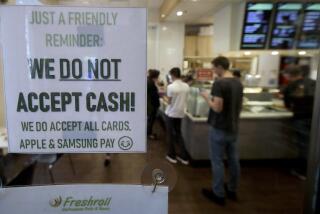‘Electric Money’: From Bills to Bytes
- Share via
For anyone over the age of 40, watching tonight’s PBS program “Electric Money” is likely to induce a bit of awe (8 p.m., KCET; 9 p.m., KVCR). It chronicles the history of a dramatic global revolution that has unfolded entirely in the course of their lives: what host Robert X. Cringely calls the transformation of money from “bills to bytes.”
Opening the two-hour program beneath the streets of New York City, Cringely shows us the miles of cable over which he says a trillion dollars a day in cashless financial transactions are carried around the world.
Yet it was only in 1959, Cringely says, that Frank McNamara was dining in a restaurant, discovered he’d forgotten his wallet and came up with the idea for the credit card.
That was the start of the revolution. The advent of computer technology fueled it, and Cringely shows how the worlds of banking, business and the stock markets have been altered by the ability to conduct monetary dealings around the globe instantaneously.
Technology and finance may sound like a prescription for dullness in visual terms, but Cringely’s humor and producer-director David Davis’ effective use of music and clips from old films and TV commercials keep the program entertaining for the most part.
Particularly with regard to the stock markets, Cringely and his guests see the electronic revolution as enormously positive for capitalism, leading to greater democratization of the system and more investment. A lot of do-it-yourself online investors might not take so rosy a view at the moment, but no one ever said the technology would eliminate the risk.
More to Read
Inside the business of entertainment
The Wide Shot brings you news, analysis and insights on everything from streaming wars to production — and what it all means for the future.
You may occasionally receive promotional content from the Los Angeles Times.










